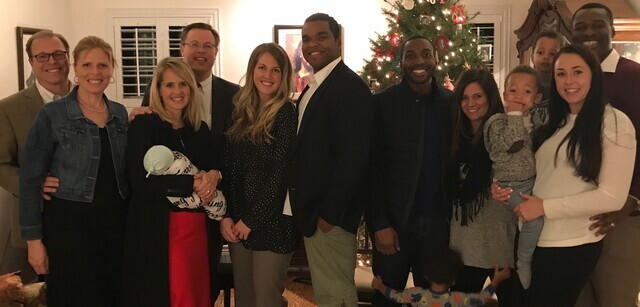This article was originally published in May 2021.
Newly called General Authority Seventy Elder Clark G. Gilbert still remembers the first time he received a testimony of the restored Church. He was a high school student about to run a track race in Scottsdale, Arizona, an area with a good number of Latter-day Saints, when he spotted a familiar face.
“I was at a track meet way across the valley, and I was stretching my tight hamstrings and listening to some highly motivational music getting ready to run my race,” Elder Gilbert recalls over three decades later. “I looked across the track and I saw Brother Butler [my Young Men leader] standing there. And the Spirit said, ‘This Church is true or there’s no way he would be here at your track meet.’”
When Elder Gilbert moved to Boston, Massachusetts, for graduate school in 1997 with his wife, Sister Christine Gilbert, he received a call to serve as a youth leader. Unlike what he had experienced in high school, however, these young men only had a handful of fellow Church members in their high schools. Elder Gilbert wanted to be for them what Brother Butler had been to him.
But at the time, he had no idea how much these “Boston boys” would come to mean in his life.
Perhaps the impact of the Boston boys was best expressed by his 9-year-old daughter after the family had left Massachusetts and moved into a new ward in Utah. The bishop’s wife asked how many children were in their family.
“We have seven kids [in our family], but my dad has these other boys in Boston,” came her reply.
The truth is these Boston boys didn’t belong to the Gilberts. They had their own parents, and they also had many other youth leaders who loved and cared about them as if they were their own. But the Gilberts’ daughter was right that her parents had left a piece of their hearts and a part of their Church family in Boston.
And the Gilberts weren’t the only graduate students at the time whose lives were changed forever by their association with these young men. Other young couples, like Matt and Jennifer Sanders, also fell in love with the Boston boys. Like the Gilberts, the Sanders had a young family at the time and Matt served as a Young Men president while enrolled in a master’s program at the Harvard Kennedy School of Government.
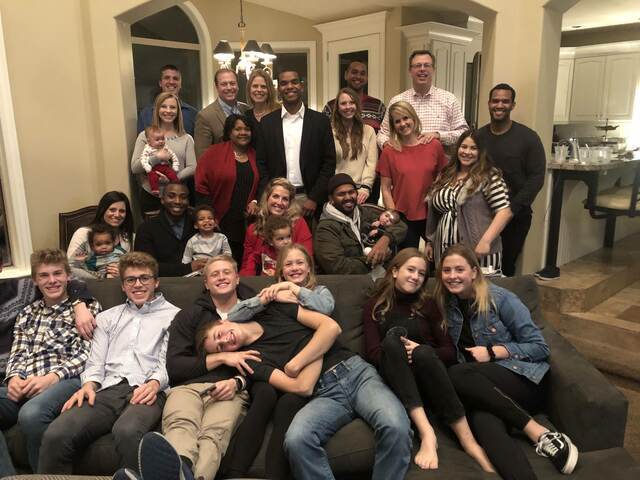
“I would say the long-term effect on my life is one that is irreplaceable really,” Sanders says, trying to contain emotion before adding, “These are great memories.”
It was just a brief period of time—a period when these young couples happened to be in the same place at the same time with a group of teens who changed their lives.
Emmanuel Nnah
Born the son of two Nigerian immigrants who came to the United States in the 1980s, Emmanuel Nnah was born and raised in Boston. His father converted to The Church of Jesus Christ of Latter-day Saints in 1984 after feeling “a burning desire to ... draw closer to God and belong to a church.” As a result, Emmanuel and his brother James were raised in the church, the sons of parents who gave their all to the gospel of Jesus Christ.
“They never looked back,” Matt says of Emmanuel and James’s parents, Simeon and Mabel Nnah. “They were devoted. You know the scripture that says they prayed in their outgoings and incomings? (See Doctrine & Covenants 109:17–18.) They would pray before the children left the house or at the doorstep. No matter what, they would always pray before the children left the home.”
Matt describes the Nnahs with two words: “dignity” and “regal.” They were people who knew who they were and who taught their children the significance of their divine worth.
“They armed their children with an understanding of who they really are as sons and daughters of a Heavenly Father who loves them. Those children walked out into the world, no matter their living circumstance or their perception in society, with their heads high, knowing who they really are as sons and daughters of our Heavenly Father,” Matt says.
As their sons grew up, they came to appreciate the sense of belonging and structure the Church brought into their lives.
“I believe wholeheartedly that kids want structure, they want understanding, they want purpose, and I think that the Church gave me that,” Emmanuel says. “Kids in the inner city, we gravitate toward gangs because it gives us this sense of family that maybe we’ve never had before. ... We gravitate toward sports because it does the same thing.”
He says that the Church gave him that structure, but it began in his home.
“My parents did a great job of instilling that in us. You’re a child of God, you’re more than baggy pants and cornrows. You’re more than just rap music. You’re more than basketball or football,” he says. “This is who you are. This is what you’re going to become and then that centers you. ... That’s your compass.”
Emmanuel, or E-man as his friends call him, was the oldest of the group of Boston boys. Even years later, he is described as the “cool kid” and someone the others looked up to.
Jonathan Ubri
In high school, Jonathan Ubri had gotten in with the wrong crowd. He was a good kid and he knew that everyone around him knew it, but he was making poor decisions and practically lived in the principal’s office. During the summer between his freshman and sophomore years, Jonathan knew he needed to find a way to distance himself from the influences in his life, and he remembers praying for help.
The answers to his prayers came in unexpected ways—one of them in an invitation to attend a birthday party at a church. What he didn’t realize was that he was already a member of that church. He just didn’t remember it.
When he was 7 years old, Jonathan’s mom was struggling following a separation from his father when she saw a commercial for the Church on TV. She called the number; missionaries came, and soon thereafter she and her two sons, including young Jonathan, who had just turned 8, were baptized. But Jonathan’s mom didn’t have a car and the family was dependent on rides to and from Church. Their attendance soon trailed off, but when he went to a birthday party years later as a high school student Jonathan knew something about the church building looked familiar. He knew he had been there before.
After confirming that he was already a member of the Church, Jonathan immediately got involved, and, as he did, he became a lot more serious about school. He found a place to belong and people to look up to.
“The Young Men program, not just at a ward level but at a stake level, was so unified,” he says. “I’ve never seen anything like that. ... To this day, I don’t think that type of unity and brotherhood exists [elsewhere].”
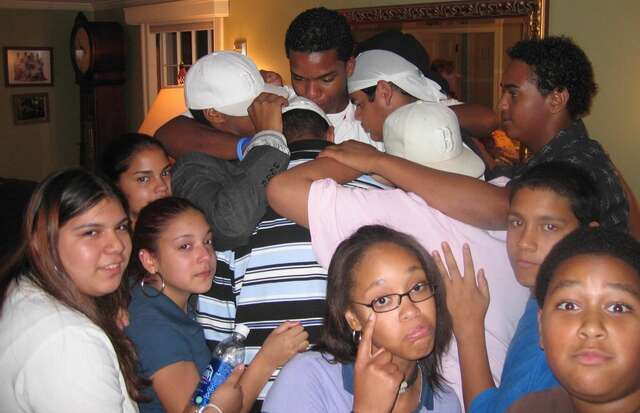
Emmanuel believes it was the Spirit that bonded them together.
“We’ve cried together, we’ve laughed together, we’ve felt the Spirit together, we’ve traveled together. It’s so much more than just a surface-level understanding of individuals,” Emmanuel says. “I think it’s because you take that association that you have and you mix it with the Spirit testifying to all of you at the same time in the same place that, ‘Hey, there’s something beyond this. There’s something more.’ And I think that’s what links you together forever.”
Graduate Students
Jonathan and Emmanuel are just two of the Boston boys, but there are many names: Junior, Jessie, James, Gabriel; the list continues. The list of their Young Men leaders, many of whom were young graduate students, is just as long. The leaders hadn’t come to Boston in search of a hobby—they had plenty on their plates. So why choose to spend the majority of their free time with a bunch of inner-city high school students?
“You couldn’t go into those wards and see the need and not step up,” Elder Gilbert says. “You can’t go into that building, you can’t meet Jonathan and Emmanuel and Junior and James and Jesse and Gabriel and on and on and on. ... What are you going to do? Just go back and study econometrics by yourself?”
Sister Gilbert agrees but adds what they have discovered in retrospect.
“I think we were maxed out with everything that we were doing, but it just felt like the right thing to do,” she says. “We were needed. They needed us there. And the thing I think we didn’t realize as we were going along was [that] we really needed them too.”
As these young couples turned their lives over to the Lord and made themselves available, they found unexpected blessings. In Elder Gilbert’s case, he had decided not to study on Sunday and instead devoted that day to Church service. He was in a doctoral program at Harvard Business School, where he says he was not the smartest guy in the program. The decision to refrain from studying on the Sabbath meant that his classmates had an additional day every week to study. But an interesting thing happened.
“By the second year, these guys were worn out. They were exhausted. They hadn’t taken time to heal and recuperate,” Elder Gilbert recalls. “While I was working really hard every Sunday, intellectually I had recharged my battery. And by the second year, I was in a more sustainable rhythm. Maybe it’s because the Lord was blessing me, and maybe it was because I was fresh, but I needed that time on the weekend to breathe and be a normal human again, and that calling did that.”
Matt says he is grateful that the Lord accepted these young couples’ imperfect efforts.
“I look back on my time serving in that ward—I wasn’t that good,” Matt said, later adding, “but just acknowledging that we show up, we do our best, we signal to the Lord that we’re willing to be on His errand, and He makes remarkable things happen. ... He makes more of us than we could make of ourselves. And then way downstream, we look back at the small and simple things we were involved in.”
Elder Gilbert’s calling to serve in the Stake Young Men presidency was not a calling he was initially excited about, but in retrospect, he says that calling is only comparable to his mission in terms of impact on his life. Matt agrees.
“It was an apprenticeship in discipleship in that moment that blessed my life,” Matt says. “I learned how to teach the gospel on my mission. I really feel like I learned how to live the gospel and serve among those people [in Boston], and there’s nothing in life equal to the joy that you feel when you know you’re on the Lord’s errand and you’re doing your best.”
Sister Gilbert says their Church service in Boston has impacted everything in their lives since.
“I’ve always said there’s nothing that prepared me more to be a mother of [now] eight children than our years in Boston,” Sister Gilbert says.
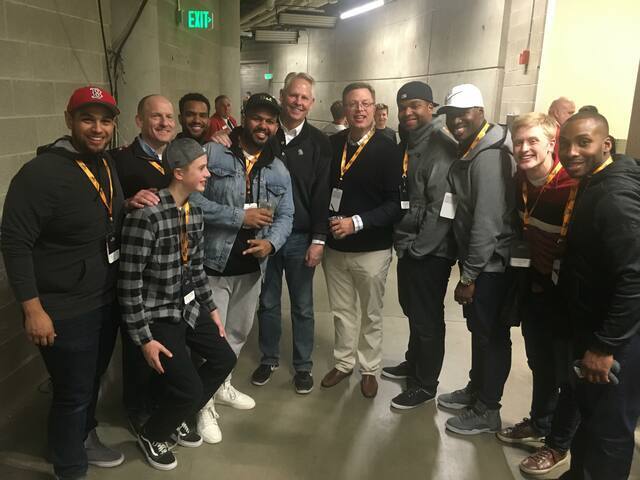
It is something that has meant more with time. But they didn't know until years later just how much it meant to the boys themselves.
When Jonathan returned home from his mission, he told Sister Gilbert that on dark, hard days, he would envision in his mind how it felt to be in the Gilberts’ home in Boston, and then he knew he could keep going. He knew everything was going to be okay because he would have the chance to go to their house again in the future.
Great Expectations
The Boston boys knew their youth leaders expected the best of them, and they knew their youth leaders had complete confidence in the blessings the Lord had in store for them. Elder Gilbert says he is a big believer that “when you expect less from people, they’ll give you less. And when you expect more, they’ll give you more.” He believes that when you expect the very most of people, you see their divine potential. This is why he let the Boston boys know he expected them to go to college, to go on missions, and to get married in the temple.
“Whether they knew it in the moment or not, they felt it—that everything their Father in Heaven had for His children, every single part of it was there for them,” Elder Gilbert says. “And it was expected of them. There was never going to be an excuse that they were lower income or from a part of town that didn’t go to college.”
When Jonathan graduated from BYU–Idaho, he called Elder Gilbert, who told “his boy” he wasn’t surprised at all. “Clark, you don’t understand,” Jonathan said. “No one from my high school went to college ... there were metal detectors in my high school.”
But they didn’t just go to college. They also went on missions. They got married in the temple.
“My goal changed in life,” Jonathan says of what the gospel did for him. “My goal became way more meaningful and my perspective on life became eternal. In my mind, the most important thing that we need to focus on is our own salvation, our own exaltation with our family, and then number two is helping others to do the same, to achieve the same goal.”
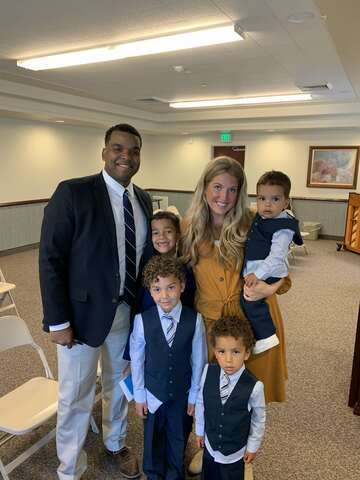
So today, the Boston boys, who are now men—husbands and fathers—visit and tell another generation what they’ve learned and how the gospel has brought joy into their lives. Matt recalls the joy of watching his Boston boys give his oldest son advice prior to his mission, the same son the Boston boys had helped carry to the car when he was a baby.
“Just to hear them talk about obedience and hard work and sacrifice and giving it all up for the Lord and the blessings that come from the first law of heaven, which is obedience ... to hear those boys stand there—and they’re massive, right? They’re like six-foot-four, impressive, imposing, and inspiring men now—to hear them teach my son was quite the full circle,” Matt says.
Elder Gilbert remembers a full-circle moment of his own from those days in Boston. It came when he learned that one of his young men was planning to go to New York City for the weekend with a young woman rather than attend a youth conference. And, as he recalls it, he just “couldn’t let it lie.” He called the young man’s phone all night the night before and texted him; miraculously, the boy showed up at the conference.
Elder Gilbert says it wasn’t an unusual or extraordinary conference. On day two, Elder Gilbert didn’t feel he had a great spirit about him as he ran to fill in for a teacher who hadn’t shown up. But he found himself talking directly to this young man as if there were no one else in the room. The story he told? The time Brother Butler showed up at his track meet.
“I was telling that story and I could feel God behind me, and I could feel His light coming through the back of my head through my body and into [this young man],” Elder Gilbert remembers. “And even today, when he has a moment of struggle or difficult times, we don’t even have to say a word, we just acknowledge that experience. We both know what happened. He felt it, I felt it. That same story that sparked my own testimony from my young men leader all those years ago was now part of the testimony journey of another young man in an entirely different time and place. That’s the full circle of the gospel.”
“I mean, I didn’t even know the Church was true. I just knew Brother Butler loved the Church and it couldn’t not be true if he loved it that much that he would invest so directly in a young man’s life.”
When asked what makes a good youth leader, Jonathan doesn’t mince words.
“Just be normal. Just be yourself. Don’t change your voice when you’re bearing your testimony. Don’t try to project yourself in a certain way when you’re serving or saying prayers,” he says. He adds that you don’t have to perform a huge miracle, but, as he puts it, “Do the small things; that’s the stuff that matters.”
And when Jonathan thinks about his time as a Boston boy, he sees the impact his youth leaders had on his testimony, especially his testimony of the Savior.
“I honestly believe that when we see the Savior, it’s going to be so much more meaningful because we are going to realize that He’s a person too with a personality. ... When we meet the Savior, I think it’s going to be that feeling of ‘Man, He is so perfect.’ And not in the sense of perfect—never made a mistake—though that is true. We’re going to be like, ‘He is so perfect. That’s exactly what I envisioned but nothing like what I imagined.’”

